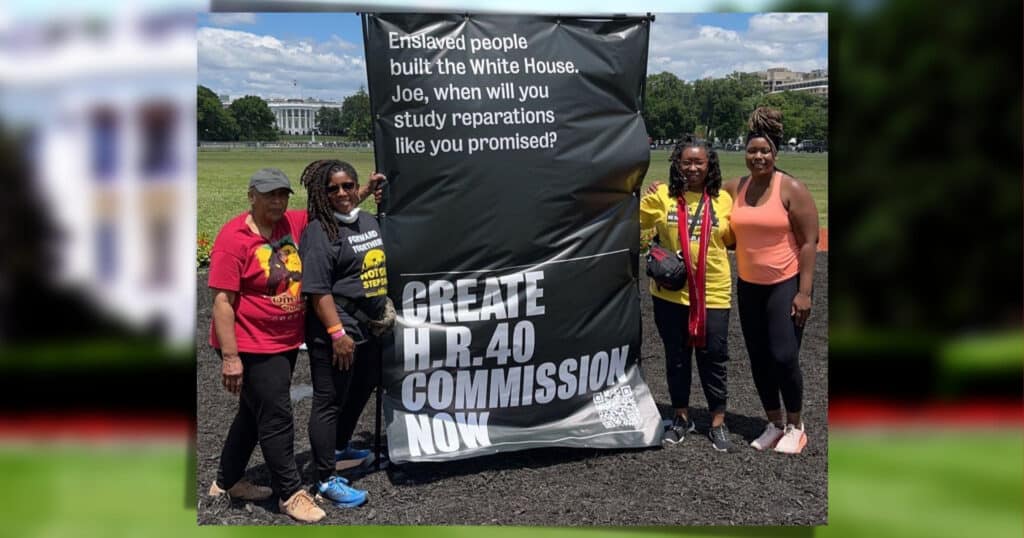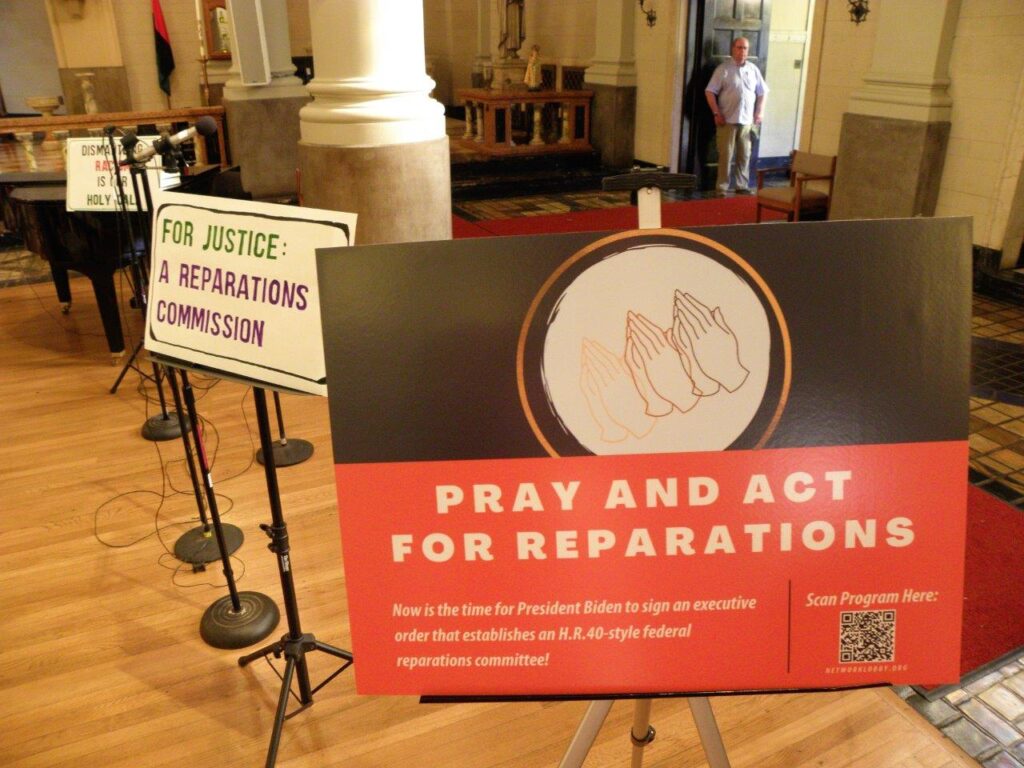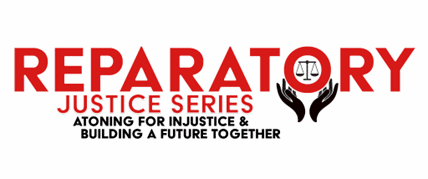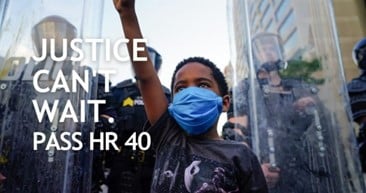Race, Ethnicity, and Reparations

Zacchaeus stood up and said to the Lord, “Look, Lord! Here and now I give half of my possessions to the poor, and if I have cheated anybody out of anything, I will pay back four times the amount. — Luke 19:7
Reparations
Luke tells the story of Zacchaeus, a tax collector who had built wealth by exploiting his own people. Drawn to Jesus, he climbed up a tree to hear the teacher, only to be singled out and invited to host Jesus for dinner. Jesus saw Zacchaeus’ true potential and welcomed him into his inner circle, and the experience of Jesus’ acceptance and grace transformed Zacchaeus. Once a man who had betrayed his people for personal gain, Zacchaeus now promised to return what he had taken and more.
The story exemplifies our shared responsibility to reduce economic and social inequalities, and repay past transgressions: after meeting with Jesus, Zacchaeus begins a routine of giving half his possessions to feed the poor. Efforts to address inequality are not charity, they’re our Christian obligation to justice.
When we consider the history of exploitation that shaped our nation – the original sin of slavery, by which the United States and other European nations enriched themselves through the labor of black and indigenous peoples – we cannot help but see a great evil that has never been righted. The Emancipation Proclamation didn’t right the wrong of slavery and neither did the 1965 Voting Rights Act. Those changes were necessary steps toward equality and hope for the future generations of Americans, but they did not address the sins committed against the once enslaved, nor offer a true accounting for the wealth stolen in the generations since from racist extractive policies, like redlining and subprime housing loans, or affirmative action for white wealth-building, like the early GI Bill and Social Security Act.

As Christians, we have a rich history of repentance on which to draw. In the Isaiah passage above, God speaks directly to God’s people, offering a way forward: “remove the yoke from among you… offer your food to the hungry and satisfy the needs of the afflicted.” The language these days for this work is “reparation” — actions taken to “make amends, offering expiation (atonement), or giving satisfaction for a wrong or injury”. In practice, reparations can take the form of cash payments to affected peoples, as was given to Japanese Americans who were forced into internment camps during WWII, or can include significant, sustained investment in the health and economic development of harmed communities.
The need for reparations must be understood not only as an issue inside the United States, but also within the global context. Africans were enslaved throughout the North and South American colonies, and Europeans in the United States remained in North America to build the infrastructure of a post-slavery economy. Caribbean and South American nations were underdeveloped and then abandoned by the Europeans and Americans who extracted wealth from the land and then left the people they enslaved to fend for themselves. The deadly cocktail of white supremacy, colonialism, and even predatory capitalism has left many people of color in our global community in abject poverty without any hopes of economic mobility. This injustice has bred massive wealth gaps, health disparities, ecological devastation, and national debt crises in many of these young nations that are directly traceable to massive European and American disinvestment in their once European and settler-colonies. The struggles of these peoples are not “someone else’s problem.” They are our people, our problems.
Reparatory Justice
The UCC is working toward reparations, at both a local and a national level. Watch the video above to learn about what reparations could mean and the breadth of reparations efforts around the world. Below are specific ways your church can engage in reparatory justice.
Study Reparatory Justice: Webinar Series

The UCC has partnered with the National Council of Churches and other denominations to create a webinar series to educate churches about the national and global reparatory justice movement in order to take faithful action to “repair the breach” as commanded in Isaiah 58:12.
You can invite your church to study reparations and follow along with this series. Host discussions after the sessions to discuss how you can support the policies and issues that most touch your community.
Below are the Introductory Reparatory Justice 101 episodes:
Reparatory Justice Series: Reparatory Justice 101 Pt 1
Reparatory Justice Series: Reparatory Justice 101 Part 2 and Global Scope
See the full series
HR-40: A Bill to Found a Commission to Study Reparations
The United Church of Christ and the Why We Can’t Wait Coalition are among those pressing for enactment of H.R. 40, the “Commission to Study and Develop Reparation Proposals for African Americans Act” – either by an act of Congress or by executive order. If passed, the bill would establish a 13-member commission to study the lasting effects of slavery and racial discrimination. The commission would offer “appropriate remedies” to Congress.

In 1980, the US Congress established a similar commission to investigate the forced relocation and internment in camps of Japanese Americans and others during World War II, which paved the way for a formal reckoning with these serious human rights abuses, including financial compensation to surviving victims. HR 40 will follow this existing precedent.
Your church can support this effort by educating your congregation about HR-40 and the need for reparations and by writing your congresspeople and signing statements of support for HR-40.
Articles and Videos about UCC HR-40:
- Economic justice minister: It’s time for real action on reparations
- Black Reparations / H.R. 40 Vigil in Cleveland – Rev. Traci Blackmon, Speaker
- UCC among faith groups pushing Biden to form reparations commission
- UCC leaders laud historic legislation on reparations, heading to House vote
- Faith leaders turn up the heat in DC, urging Congress to take up H.R. 40
Local Reparations Efforts
Your church doesn’t have to wait for state or national action to start working toward just reparations. Local churches, like Arlington Community Church UCC, have been thinking creatively about what reparations can look like in their communities.
After studying broader reparations efforts, white members of Arlington Community Church decided to kickstart what they call a “reparations project” meant to fight the causes of the wealth gap between Black and white people in their community. After listening for many months to learn what would make a difference for their Black neighbors in California’s Bay Area, they heard: down payments for homes. And so they responded.
Raising money, they created the Black Wealth Builders’ Fund and began giving zero-interest home loans that don’t have to be paid back until the home is refinanced or sold. These loans are designed to help black neighbors open the door to the generational wealth that should have been theirs long ago.
Read more about this effort:
Bay Area church fights racism by raising money for down payments on homes
Other Reparations Webinars and Articles
- Before Building the City, Repair the Breach
- Online Juneteenth event calls UCC, friends to immediate, ongoing actions for racial justice
- Repairing the Breach: Climate Justice, Land, Debt and Reparations
- The Green New Deal and Reparations

Questions?
Please contact Sekinah Hamlin, UCC Minister for Economic Justice at Hamlins@ucc.org or join the UCC Economic Justice Champions to get updates about educational events and opportunities to take action.
